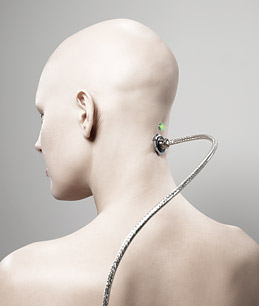Time Magazine, February 10, 2011

On Feb. 15, 1965, a diffident but self-possessed high school student named Raymond Kurzweil appeared as a guest on a game show called I’ve Got a Secret. He was introduced by the host, Steve Allen, then he played a short musical composition on a piano. The idea was that Kurzweil was hiding an unusual fact and the panelists — they included a comedian and a former Miss America — had to guess what it was.
On the show (see the clip on YouTube), the beauty queen did a good job of grilling Kurzweil, but the comedian got the win: the music was composed by a computer. Kurzweil got $200. (See TIME’s photo-essay “Cyberdyne’s Real Robot.”)
Kurzweil then demonstrated the computer, which he built himself — a desk-size affair with loudly clacking relays, hooked up to a typewriter. The panelists were pretty blasé about it; they were more impressed by Kurzweil’s age than by anything he’d actually done. They were ready to move on to Mrs. Chester Loney of Rough and Ready, Calif., whose secret was that she’d been President Lyndon Johnson’s first-grade teacher.
But Kurzweil would spend much of the rest of his career working out what his demonstration meant. Creating a work of art is one of those activities we reserve for humans and humans only. It’s an act of self-expression; you’re not supposed to be able to do it if you don’t have a self. To see creativity, the exclusive domain of humans, usurped by a computer built by a 17-year-old is to watch a line blur that cannot be unblurred, the line between organic intelligence and artificial intelligence.
That was Kurzweil’s real secret, and back in 1965 nobody guessed it. Maybe not even him, not yet. But now, 46 years later, Kurzweil believes that we’re approaching a moment when computers will become intelligent, and not just intelligent but more intelligent than humans. When that happens, humanity — our bodies, our minds, our civilization — will be completely and irreversibly transformed. He believes that this moment is not only inevitable but imminent. According to his calculations, the end of human civilization as we know it is about 35 years away. (See the best inventions of 2010.)
Computers are getting faster. Everybody knows that. Also, computers are getting faster faster — that is, the rate at which they’re getting faster is increasing.
True? True. Continue reading “2045: The Year Man Becomes Immortal”
